- Home
- Susan Fleet
Natalie's Dilemma: a Frank Renzi crime thriller (Frank Renzi novels Book 7) Page 2
Natalie's Dilemma: a Frank Renzi crime thriller (Frank Renzi novels Book 7) Read online
Page 2
A chill skittered down her spine. Recently there had been some kidnappings in Venice, wealthy people held for ransom by gangsters. Lord knows the Ruffino family was wealthy.
Fatima made the sign of the cross. Should she call the polizia?
Sophia hadn't told her she planned to go anywhere, but maybe some friends had stopped by unexpectedly and invited her out for lunch.
If she called the polizia and made a fuss, the Ruffinos might dismiss her. With a heavy sigh, she picked up the grocery bags and set out for the house. She was probably worrying over nothing.
CHAPTER 2
9:30 AM – New Orleans
“Bottom line,” Morgan Vobitch snapped, “the maggots got away.”
Frank bit back a sharp retort. Vobitch supervised the D-8 homicide detectives and was furious that one of his men had been shot. Frank was too, but his primary emotion was overwhelming relief. Kenyon was alive, in stable condition now that he was out of surgery.
“David did the right thing,” Frank said, “stayed with Kenyon until I got there.”
“Of course he did. It just galls me that we didn't catch them. We're gonna get those motherfuckers.” Vobitch didn't raise his voice, but it seemed loud in the hushed corridor outside Kenyon's hospital room.
Frank glanced at the nurse's station down the hall, hoping they didn't hear the F-bomb. No point telling Vobitch to cool it. He looked haggard, his face unshaven, his silvery-gray hair disheveled, his temper frayed to the breaking point. It had been a long and stressful four hours.
“David saw them take off in a dark SUV, but he was too far away to get the plate number. We'll check RMV, see if we find an SUV registered to King Rock.”
“No ID on the other shooter?” Vobitch said.
“Not yet. David and I talked to Angelique's neighbors—”
“But nobody's talking, right? Nobody saw nuthin. Our only witness is a traumatized kid.”
“Beyond traumatized. When we went in the room he was standing there, staring at his mother's bloody corpse. Once the crime scene was secured, Kelly took him to Social Services.”
“Good luck with that. Get caught up in the red-tape, could be a nightmare.”
“Exactly. Kelly said it took three hours to get him squared away. She called Angelique's mother, hoping she'd take him, got no answer. When we talked she was on her way to the mother's house to do the notification.” No need to mention that Kelly was also traumatized, devastated that her client had been murdered.
“We got two different caliber casings,” Vobitch said, “but no guns. Christ, they could be anywhere. Drop 'em down a storm drain, we'll never find 'em. We need to ID the second shooter.”
“David and I drove past the B-n-L pharmacy, corner of Basin and Louisiana, figuring we'd talk to King Rock's bangers, but they made us and scattered. Then we went to his mother's house. She said he wasn't there, she hadn't seen him in weeks.”
Vobitch curled his lip in disgust. “His own mother wants nothing to do with him. These scumbag drug-dealers would shoot their own mother if she got in their way. Hell, King Rock shot the mother of his own child.”
Frank scratched the jagged scar on his chin, stark white against the dark stubble. He hadn't shaved or showered since yesterday morning. Not even the antiseptic hospital smell could override the stink of sweat emanating from his shirt. “Maybe they both shot her.”
“Wouldn't surprise me.” Vobitch gazed at him, his pale-gray eyes full of outrage. “But King Rock shot Kenyon, damn near killed him. David saw him do it. ”
“Good thing the nurse came out and helped. I stopped by her apartment before I came here. Nobody answered the door, but she might be working.”
“Or hiding. Doesn't want to talk to us.”
“What did you tell the media?” After the EMTs loaded Kenyon into the ambulance, he'd called Vobitch, who arrived ten minutes later. By then Iberville was swarming with cops, and the media was out in full force, camera crews, reporters and photographers.
“Nothing. One unidentified female, murdered, one NOPD officer shot, transported to the hospital, no suspects.” Vobitch flashed his evil smile. “But we know damn well King Rock did it. If the fucking surveillance cameras in Iberville were working, we'd nail his motherfucking ass.”
The door to Kenyon's room opened and Tanya stepped into the hall. Every time Frank had seen her—at Kenyon's house or NOPD parties—Tanya looked like a fashion model, impeccably dressed, not a hair out of place. Now her face was drawn, her shoulder-length dark hair uncombed, wearing a worn pair of jeans and a sweatshirt, probably the first thing she grabbed when he'd called her with the news every cop's wife dreaded. Your husband's been shot.
He went over and hugged her, felt her chest heave as she stifled a sob. “He's gonna be okay, Tanya. Do some PT, he'll be as good as new.”
“You saved him, Frank.”
“No, I didn't. The nurse did. She put a tourniquet on his leg.” Even now he got queasy, remembering Kenyon's bloody thigh.
Tanya nodded but her eyes remained somber. “If they hadn't gotten him here fast—”
“Don't even think about it. This time tomorrow he'll be flirting with all the nurses.”
That got him a tiny smile. Outgoing and full of pizzazz, Tanya worked for a public relations firm. She was smart, attractive and a great mom, dealing with two teenagers, a full-time job and a husband who often worked overtime.
Vobitch joined them, his steel-gray eyes somber, and took Tanya's hands in his. “You need anything, no matter what it is, call me and I will make it happen.” Built like a Sherman tank and twice as tough, Vobitch could be foul-mouthed and obnoxious, but under the gruff exterior he had a heart of gold.
Tanya's eyes welled up. “Thank you.”
“We take care of our own,” Vobitch growled, visibly fighting to control his emotions.
As Tanya walked down the hall toward the elevators, Frank's cellphone rang, shrill in the quiet hallway.
He answered before it could ring again.
“I got a lead!” David said. “Went back to the B-n-L corner, grabbed one of the bangers. Jeez, a nine-year-old kid selling drugs. At first he wouldn't talk, but when I threatened to bring him to the station, he told me Rocket Man was driving King Rock today.”
“Great!” Frank said. “The name doesn't ring a bell, but the Gang Unit might know him.”
“I'm on it,” David said, and ended the call.
Frank told Vobitch the news, ended by saying, “A nine-year-old kid delivering drugs.”
“That's why they use him. No jail time for juvys.” Vobitch massaged his bloodshot eyes. “I'm going home for a quick shower and shave, pretty up for my next press briefing. Keep me informed. You get anything on King Rock, I want to hear about it ASAP.”
“Will do,” Frank said, and headed for the elevators, already planning his strategy, eager to find Rocket Man. King Rock's wheel man. Another gangbanger, who might also be a killer.
_____
Venice, Italy 5:40 PM
In the courtyard behind the Peggy Guggenheim Museum, Natalie leaned over the balustrade, gazing at the Grand Canal. The setting sun cast golden light over buildings on the opposite bank, sending dazzling reflections over the water. It was almost as gorgeous as the special exhibit she'd come here to see, paintings by French Impressionists: Claude Monet, Edgar Degas and Édouard Manet.
The Manet Olympia was her favorite, on loan from the Orsay Museum in Paris. It brought back memories of Willem, her first love. She'd met him at the Orsay, years ago. Before she began killing people. Before she escaped from Frank Renzi.
The thought made her shiver. Renzi, the relentless detective who never gave up, was still looking for her. Of this she was certain. But she felt relatively safe in Venice. Ling Lam was the name on her passport, but she called herself Laura, enjoying life in this beautiful city.
Reluctantly, she turned away from the Grand Canal. She was alone in the courtyard. Most of the visitors had left. At six o'clock, the mu
seum would close. On her way to the entry door she paused beside the Marini sculpture, Angel of the Citadel, a naked man astride a horse, legs dangling, arms flung wide, his face turned up to the sky. The most startling element was his large erect phallus.
According to the guide-book, when Peggy Guggenheim had Marini cast the sculpture in bronze in 1950, she asked him to make the phallus removable, to hide it from guests arriving at her home via the Grand Canal who might be offended. Some museum goers took selfies beside the statue, pointing at the erect phallus, and posted them on Facebook.
She would never do that, of course. She couldn't afford to have anyone see her here.
A sudden noise startled her. Rat-a-tat-tat. She knew that sound. Some might assume it was firecrackers but she knew better. The rat-a-tat-tat came from an automatic weapon.
She held her breath. Heard more rapid-fire shots.
Terrified, she looked around. Nowhere to hide in the courtyard. If she went inside the gunmen might see her, but out here she was a sitting duck. She ran to the entry door, ducked inside and froze.
More gunshots and faint voices coming her way down the corridor, shouting “Stop!”
Was this an art heist? Her heart pounded in remembered fear. She'd stolen a few paintings herself, but never in the daytime, never shooting at guards who were chasing her.
She dug her nails into her palms. The footsteps were louder now, closer. A large bushy shrub stood ten feet to the right of the entry door. She darted behind it and squatted, hiding behind the thick greenery.
Seconds later she heard footsteps.
Through a small gap in the greenery, she saw a black-clad man with a knapsack in one hand. A balaclava covered his face. In his right hand he held an automatic rifle. His finger was on the trigger.
Her stomach clenched in a knot. If he saw her, she was dead. Motionless, she held her breath.
He ran out the exit door, shouting over his shoulder in Italian, “Hurry! The boat is here.”
Another man raced into view, followed by the slender form of a woman, also dressed in black, their faces hidden by balaclavas. The second man held an automatic rifle. The woman held the hand of a little girl in a red dress, dragging her toward the exit door.
“Get in the boat!” the second man yelled. He turned and fired down the corridor.
Yes, get in the boat, she silently implored. Then she might be able to escape before the guards arrived. She studied the girl, five years old perhaps, wearing a red dress and white leggings, her face frozen in fear, her large dark eyes full of terror.
As though sensing her scrutiny, the girl turned and spotted her. But then the woman dragged the girl out the exit door.
Distant footsteps pounded down the corridor, museum guards pursuing the gunmen. Soon the police would arrive, and certain disaster. She couldn't let them find her. The polizia would ask too many questions and the carabiniere officers would check her passport.
She left her hiding place, ran out the exit door and saw the black-clad men jump into a cigarette boat. The woman scooped up the girl and jumped in after them. The whine of high-powered engines reached her ears as the boat sped away on the Grand Canal.
She raced past the Marini sculpture to the boat dock.
The footsteps were closer now, the voices louder. “Polizia! Stop or we'll shoot!”
Her heart slammed her chest. Already the police were here.
She kicked off her leather sandals and threw them in the canal. With trembling hands, she took out her identification papers, put them in the plastic bag with the museum guide-book and sealed it. She studied the water three feet below her, filthy and stinking of discarded refuse. Disgusting, but it was her only hope of escape.
She took a deep breath and jumped into the canal.
The frigid water shocked her. Ten seconds later she surfaced, brushed long black hair away from her face, took a big breath and dived under the water. Hugging the side of the canal, she swam to the left as far as she could. Lungs bursting, she surfaced, took another breath and dove again. She stayed underwater as long as she could, rose to the surface, took another breath and dived again.
The next time she surfaced a twenty-foot yacht was five yards away, moored to a wooden dock outside a large palazzo. She dog-paddled to the yacht, turned and looked at the museum.
Now it was bathed in light. Uniformed officers swarmed the rear courtyard near the canal, and spotlights stabbed the darkening sky. No police boats yet, but soon there would be, powerful vessels with guns mounted on their decks.
She clambered up a ladder to the wooden deck, shivering in the night air, her clothes drenched with filthy canal water. Buffeted by a brisk wind that chilled her to the bone, she checked the seal on the plastic bag to make sure her documents were dry. They were.
Her heart jolted. Distant sirens heading this way. Soon police would swarm the neighborhood.
Clenching her teeth against the chill, she scuttled along the dock toward the street, hoping no one in the palazzo would see her.
Her apartment was only a mile away. If she avoided streetlamps and stayed in the shadows, maybe she could get home without someone stopping her. She'd be safe there, for tonight anyway.
CHAPTER 3
FRIDAY – 7:00 PM – Venice
Generale di Brigatta Cesare Valenti squatted beside the body on the sidewalk, consumed by righteous anger and profound sadness. Rivulets of congealed blood extended from the woman's head into the gutter in front of Ruffino & Son Jewelers. He had met her once at a benefit for disabled children with his wife. His second wife. Elana was twenty years younger than his first wife who, like him, was fifty-three. As his former mother-in-law never failed to remind him.
That night at the benefit, Sophia Ruffino had been the most beautiful woman in the room, bellissima in an elegant satin gown, her dark hair impeccably coiffed, her face radiant, her eyes joyful.
Now her face was a death mask, eyes vacant, lips drawn back in a grimace, a single bullet hole in her forehead.
An hour after the shooting, the odor of gun powder still lingered in the air, and whistles tweeted at the end of the block, polizia officers directing drivers onto side streets away from the carnage. Police vehicles lined the street behind the dark SUV parked outside the jewelry store. Dominic Ruffino had been taken to the hospital, comatose, his skull fractured, unaware that his wife was dead and his five-year-old daughter was missing.
The chief of the Venice carabiniere questura rose to his feet. Merda! All this misery because of a fucked-up robbery. The clerk in a nearby shop had described what happened. A young polizia officer approached the SUV and engaged the female driver in conversation, probably because the SUV was parked with two wheels on the sidewalk. Then a shot rang out from inside the SUV, striking the polizia officer, who fell to the ground, mortally wounded.
Then everything happened fast. Dressed in black, his face hidden by a balaclava, a man with an Uzi slung over his shoulder burst out the door of Ruffino & Son Jewelers, a canvas bag in one hand, a pistol in the other. A second man, similarly dressed, climbed out of the SUV, dragging Sophia behind him. When she struggled with him, the first man shot her in the head. By then, people had emerged from other shops along the street. The first man fired at them with his Uzi, striking several, who fell to the ground as others fled.
The driver of the SUV, her face hidden by a balaclava, took Bianca Ruffino out of the car and shielded the girl with her body, an apparent attempt to protect her from the two gunmen. They knew it was foolhardy to flee in a car. The streets here were narrow and winding, and polizia could easily set up roadblocks. They had a different getaway plan.
Valenti studied the sprawling white building across the street. The Guggenheim Museum had drawn more visitors than usual today due to a special exhibit of Impressionist art. Fortunately, most had departed before the shooting began. The main entrance where visitors entered to buy tickets was in the middle of the building. On the right-hand corner, a second door opened into the gift sh
op. Now yellow crime-scene tape blocked both entrances.
According to witnesses, the first man sprinted to the gift shop and sprayed the store with gunfire, killing a clerk and a museum guard. The second man followed, dragging the woman and girl into the shop. As people cowered behind displays, the robbers ran to the rear of the museum, firing at the unarmed museum guards who tried to stop them.
In the choppy waters of the Grand Canal, gondoliers took evasive action to avoid a speeding cigarette boat, which stopped at the dock behind the museum. Several gondoliers saw two men, a woman and a little girl get into the boat, which immediately sped away. By the time a carabiniere speed boat and three polizia officers on jet skis arrived, the cigarette boat was long gone.
Valenti looked up at the darkening sky. Soon it would be pitch dark. With a heavy sigh, he walked toward the museum. His officers were in a conference room with the witnesses: museum guards and visitors, gondoliers, shopkeepers and passersby who had witnessed the massacre.
His cellphone rang, an annoying chirp designed to get his attention. He checked the ID. Not someone he wanted to talk to, but there would be serious repercussions if he didn't.
In English, he said, “John, you heard what happened?”
“Yes,” said a familiar deep voice. “I need to talk to the people in the museum. My target was there. Please detain all visitors.”
Valenti grimaced. John Conti was a cafoni di prima classe. A first class asshole. When it came to police matters these self-important Europol agents considered the carabiniere ignorant locals.
“We have done that already. Who is this target? Describe him.”
“Her. A Vietnamese woman. Tall and slender with Asian eyes and long black hair.”
“How do you know she was in the museum?”
“I know. And I want her detained.”
“It is chaos here. Many wounded and four dead, including a polizia officer. Only twenty-four, with a wife and two young children.”

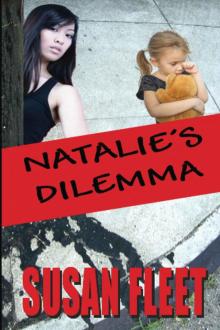 Natalie's Dilemma: a Frank Renzi crime thriller (Frank Renzi novels Book 7)
Natalie's Dilemma: a Frank Renzi crime thriller (Frank Renzi novels Book 7)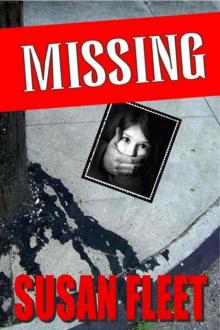 Missing, Frank Renzi Book 6
Missing, Frank Renzi Book 6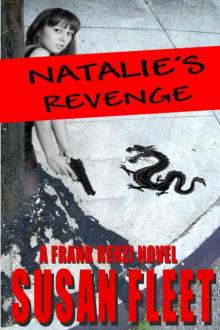 Natalie's Revenge
Natalie's Revenge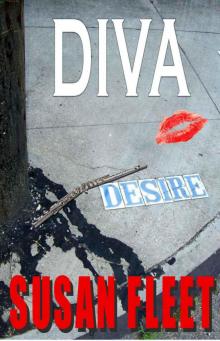 DIVA
DIVA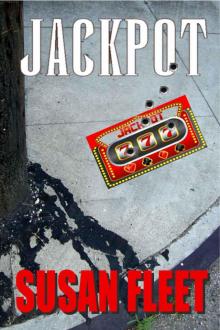 Jackpot (Frank Renzi mystery series)
Jackpot (Frank Renzi mystery series)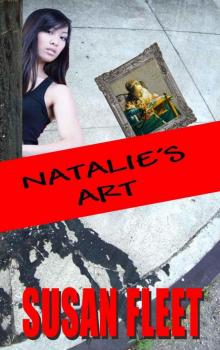 Natalie's Art: a Frank Renzi novel
Natalie's Art: a Frank Renzi novel